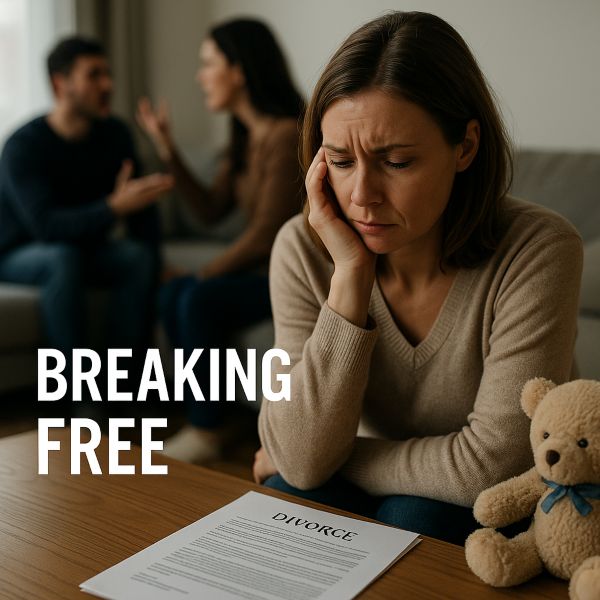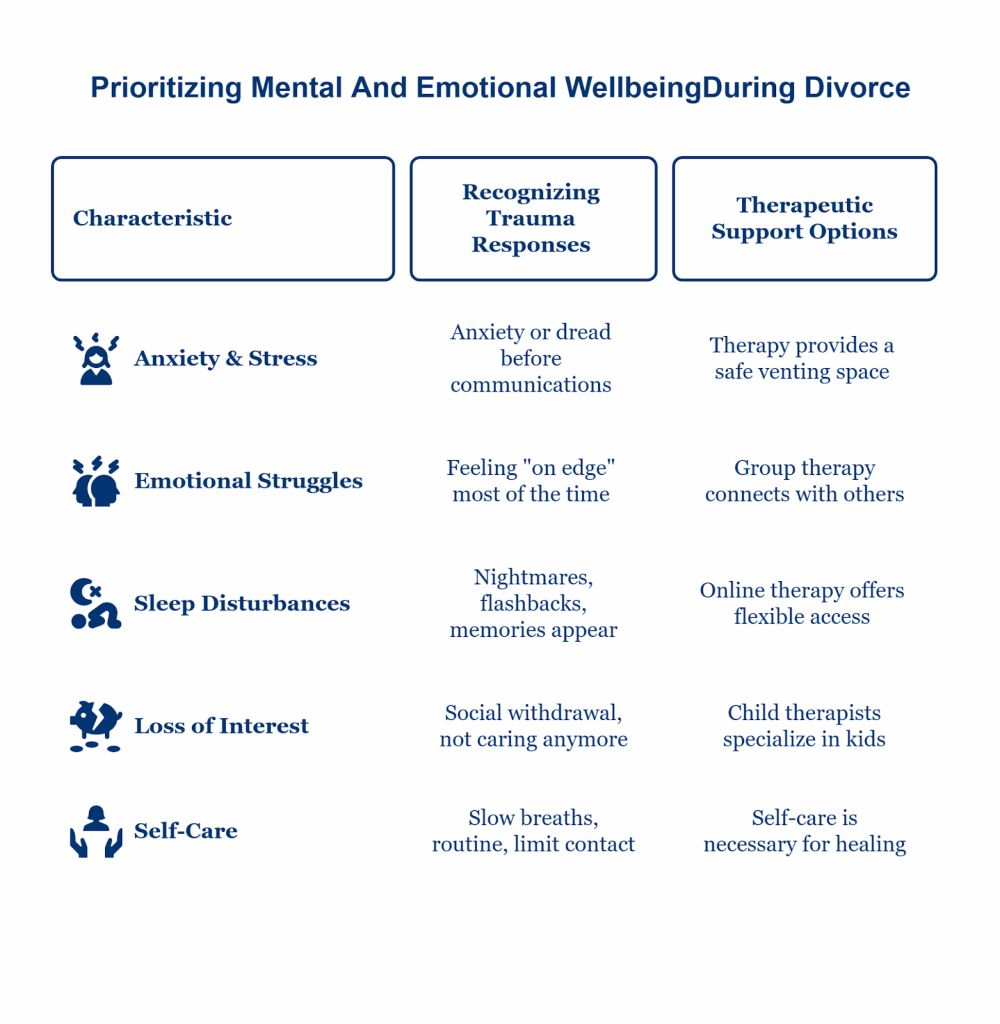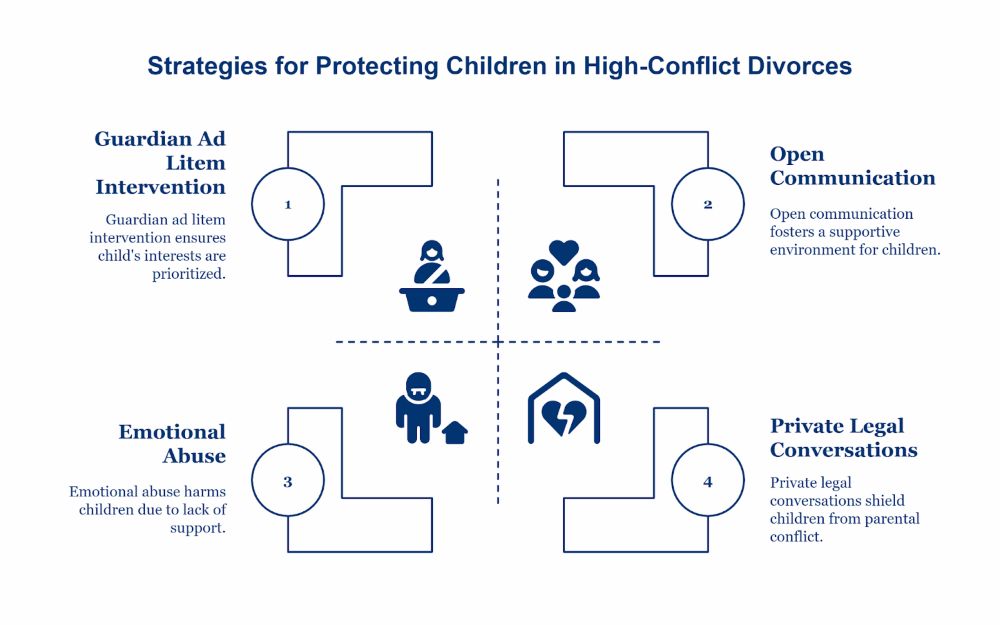

Originally published: May 2025 | Updated: August 2025
Going through a high-conflict divorce can feel overwhelming and isolating. Long battles, false accusations, and constant stress hit both mind and body pretty hard.
You can manage a high-conflict divorce without losing yourself or your well-being, even when it feels impossible.
Staying grounded, setting clear boundaries, and picking the right support can change the outcome.
People who protect their interests, seek help from helpful professionals, and focus on what they can control usually emerge stronger.
Knowing there are strategies to avoid manipulation and protect your rights matters for anyone in this situation.
A high-conflict divorce isn’t just a regular split. It’s usually full of repeated arguments, power struggles, and damaging behaviors that make co-parenting and decision-making impossible.
Knowing the causes and common traits helps you prepare strategies to protect your mental health.
High-conflict personalities tend to show up in these divorces. You’ll often see a lot of blame, defensiveness, and a refusal to take responsibility.
They repeat angry or dramatic behavior, even over things that seem small or long after the breakup. Refusing to compromise is a big red flag.
If you’re divorcing a narcissist co-parent, you might notice ongoing manipulation, emotional outbursts, or using the kids as bargaining chips. There might be frequent false accusations or attempts to control the legal process.
These behaviors make a toxic divorce even tougher. Arguments over parenting time, school choices, or money can drag you into court repeatedly.
Legal and emotional events can quickly trigger conflict. Even simple things, like arranging parenting schedules, sharing documents, or going to meetings, can escalate.
Money fights, custody battles, or property disputes often lead to threats or endless delays. Emotional triggers, like old resentment or jealousy, can spark sudden arguments or stonewalling.
The kids usually take the biggest hit. They get stuck in the middle when parents argue or don’t communicate, and feel stressed or confused.
Creating strong boundaries and planning how to respond to these triggers are crucial parts of surviving a high-conflict divorce.
Feeling overwhelmed by constant conflict? Contact Cooper Trachtenberg Law Group to discuss your options for high-conflict divorce representation and protect your emotional and legal well-being from day one.
If you’re ready to get started, call us now!

A high-conflict divorce brings anxiety, mood swings, and daily stress. People often spot new emotional struggles or even physical symptoms, so starting early to protect your mental health matters.
Trauma from a hostile divorce is common. Many people notice panic attacks, trouble sleeping, irritability, or feeling jumpy.
Others lose interest in things they used to enjoy, feel down for weeks, or worry about daily tasks. These reactions are real and affect both mind and body.
Common divorce trauma symptoms include:
Spotting these reactions early helps you get support sooner. Realizing these feelings are part of a normal stress response can make you less hard on yourself.
Some tips to stay calm are to take slow breaths, keep a daily routine, and limit contact with a hostile ex as much as possible.
Therapy gives a safe space to vent and learn coping tools. Seeing a counselor, psychologist, or social worker can help you process anger, sadness, or fear.
Group therapy and support groups let you hear from others in the same boat. Some people prefer private counseling, while others like the flexibility of online therapy.
Kids can benefit from specialized child therapists who help them work through tough emotions. Beyond therapy, community classes, divorce support programs, or online resources, support is also available.
Therapy and regular self-care—like exercise, eating well, and sleeping enough—are important ways to protect your mental health during divorce.
Making time for emotional care isn’t selfish—it’s necessary for healing and regaining strength.
Setting clear boundaries during divorce can lower arguments, reduce stress, and protect your mental health.
Strong boundaries also make it easier for parents to put their kids’ needs first, without endless fights with an ex.
Separated parents usually adopt one of two main approaches: parallel parenting or co-parenting. With parallel parenting, each parent takes care of the child on their own time and keeps contact with the other parent to a minimum.
This style works best when tough communication helps avoid conflict, while kids see both parents. Co-parenting means more direct cooperation and shared decision-making.
Parents talk more and try to agree on things like school, healthcare, and routines. This can go well if both parents can keep things civil.
Choosing between parallel parenting and co-parenting depends on the level of conflict. High-conflict situations usually call for parallel parenting because it’s safer and healthier for everyone.
For more on why boundaries matter, see these high-conflict divorce tips.
| Parenting Style | Best For | Communication Level |
| Parallel Parenting | High conflict splits | Minimal |
| Co-Parenting | Low-conflict splits | Frequent |
Apps like OurFamilyWizard and TalkingParents help keep communication short, organized, and less emotional. These tools keep track of all messages, schedules, and important info about the child.
They let parents avoid face-to-face arguments or angry calls. Written records help clear up misunderstandings and keep things focused on the kids.
Features like shared calendars and expense logs help organize appointments, school events, and money without extra drama.
Using third-party apps supports boundaries by encouraging calm, businesslike communication and giving you privacy from personal contact.
The legal choices you make during a high-conflict divorce shape your future.
Professionals who know what they’re doing are essential for protecting your rights, lowering stress, and keeping boundaries clear.
Picking the right divorce lawyer for a hostile ex can make a difference. Attorneys trained in high-conflict dynamics handle aggressive behavior, false accusations, and manipulative tactics without getting thrown off.
They spot legal boundaries quickly and help you avoid common traps. When you’re searching, ask if the attorney has managed similar cases.
A skilled lawyer will give legal tips for high-conflict separation, such as cutting unnecessary communication and focusing on evidence. Open communication and good documentation are key.
An experienced team will also work with therapists or financial experts, creating a full support system.
Sometimes, courts step in with specific court orders to limit contact between parties. These might include restraining orders, temporary custody orders, or detailed rules about how parents must communicate about their kids.
Such orders help protect people from ongoing harassment and emotional strain. If needed, a lawyer can ask for orders that require all communication to go through written channels or parenting apps.
This creates a clear record and reduces misinterpretation. Sometimes, a judge will even set rules about where and how drop-offs happen to keep kids out of the conflict.
If the other party breaks these orders, inform your attorney immediately so the court can intervene.
Ongoing custody disputes taking a toll? Schedule a consultation with Cooper Trachtenberg Law Group to explore legal strategies that enforce boundaries and prioritize your child’s safety during divorce.
If you’re ready to get started, call us now!

Kids often feel torn between parents in high-conflict divorces. Their emotional health and sense of security depend on what adults do to shield them from hostility and support their voice in custody cases.
Kids feel the impact of emotional abuse and custody battles more than most adults realize. It’s so important to keep arguments and legal drama away from them.
Talk to your children openly, but don’t drag them into blame or use them as messengers in disputes. They don’t need that extra stress on top of everything else.
A calm home helps children feel safer. Some ways to protect kids in a toxic divorce:
Don’t criticize or badmouth the other parent in front of the kids. No child should feel stuck in the middle or forced to pick sides.
Family counseling can offer a safe space for children to express emotions and manage stress. Sometimes, just having a neutral adult listen makes all the difference.
Parenting during a messy divorce means putting your child’s needs before your conflicts. Open communication and reassurance help kids process tough changes with less anxiety.
A guardian ad litem (GAL) sometimes steps in during heated custody fights. This neutral professional focuses on what’s best for the child and represents their interests in court.
The GAL might interview parents, teachers, and the child and observe family dynamics. Their report gives judges a clearer picture of which environment will best support the child’s well-being.
During a custody evaluation, both sides share information to keep things fair, especially in tricky cases with a manipulative spouse.
Working with GALs and following their advice can protect kids from being pulled into emotional battles.
Parents should cooperate honestly, provide documents, and avoid coaching the child. Support from a GAL can play a big role in protecting a child’s well-being during a high-conflict divorce.
Protecting your financial well-being during a high-conflict divorce matters. Steps like locking down joint accounts and getting a clear picture of your finances can help prevent financial abuse or exploitation.
Move quickly to protect shared accounts. Freezing or closing joint credit cards and lines of credit can prevent a spouse from accruing debt that hurts both parties’ credit scores.
Let your banks and credit card companies know about the divorce. Many people set up alerts for unusual transactions, a simple step that can save headaches later.
Gathering full financial records matters just as much. Collect recent bank statements, tax returns, loan docs, pay stubs, and investment account info.
Keep originals in a safe spot and make digital copies. Review transactions for missing funds or suspicious activity.
Staying organized is one of the best ways to avoid being taken advantage of and keep control of your money.
Accurate financial info helps you make better decisions in a divorce. Forensic accountants can be a lifesaver in high-conflict cases or when you suspect financial abuse.
Forensic accountants dig for hidden accounts, overseas assets, or odd transfers. They analyze spending and give you a clear picture of assets and debts.
This process can reveal attempts to hide money or cut off access to marital resources. Protecting assets also means changing passwords and alerting financial institutions about the divorce.
Consider putting any cash settlements or new accounts in your name only. Checking in regularly with a trusted legal or financial advisor helps make sure nothing slips by.
It’s easy to overlook details when stressed, but good advice can make a huge difference.
Healing from a high-conflict divorce is about more than just paperwork. It takes steady effort and self-care to start feeling whole again and figure out how to parent in new ways.
After a high-conflict divorce, it’s not unusual to feel lost or unsure about who you are outside the marriage. Trauma recovery after divorce can bring waves of sadness, anxiety, and doubts about what’s next.
To reclaim your identity, focus on personal values and goals that may have been pushed aside. Simple routines—journaling, joining a club, picking up old hobbies—can help you build a new self-image.
Therapists or support groups can help if you’re dealing with deeper pain. Making your own decisions again, even small ones, slowly rebuilds confidence.
Self-compassion matters a lot—be patient and forgiving with yourself. There’s no rush to “move on.”
Co-parenting after divorce can be stressful, especially if every conversation with your ex is tense. Clear communication is key, but it helps to keep messages short, focused on the kids, and free from emotional jabs.
Setting boundaries and using shared calendars or co-parenting apps can reduce misunderstandings. Stable routines stabilize kids when they’re splitting time between two homes.
Always prioritize the child’s well-being over any disagreements with your ex. A mediator or therapist can support healthier interactions if direct contact is too painful.
High-conflict divorces can wear you down, both emotionally and physically. Self-care matters, and setting boundaries is just non-negotiable in these situations.
People do better when they have clear communication guidelines. Keeping messages short and having scheduled conversations helps reduce misunderstandings and keeps the drama at bay.
If someone tries to pull you into an argument, just don’t take the bait. Protecting your mental and emotional health comes first, even if it sometimes feels awkward.
Having a solid support system makes a huge difference. Friends, family, and professionals like therapists can help you get through the rough patches.
Let’s not forget that professional legal advice is crucial for complicated decisions that suddenly arise.
Co-parenting isn’t always a walk in the park. Focusing on your kids’ needs and using respectful language are aspects of parental behavior that lead to post-marriage success..
Setting healthy boundaries protects everyone, including the kids. It’s just worth the effort.
Ready to stop the emotional chaos? Let Cooper Trachtenberg Law Group guide your high-conflict divorce toward closure with clear legal boundaries and compassionate advocacy.
What is considered a high-conflict divorce?
A high-conflict divorce involves ongoing disputes, emotional volatility, controlling behaviors, or repeated litigation, especially involving children or finances.
How do I emotionally survive a toxic divorce?
Work with a therapist or divorce coach to reduce stress and maintain focus. Set strict communication boundaries and use structured tools like court-approved messaging apps.
Can I limit contact with my ex during divorce?
Yes. You can request court orders that limit direct communication, enforce boundaries, and restrict harassment through supervised tools or structured parenting plans.
What’s the difference between parallel parenting and co-parenting?
Parallel parenting reduces contact between parents and limits communication, while co-parenting involves collaborative decision-making. Parallel parenting works better in high-conflict cases.
How can I protect my children from the conflict?
Avoid talking negatively about your ex around your child. To reduce exposure, request a guardian ad litem, use structured exchanges, and follow court-approved parenting plans.
Can my ex hide finances during divorce?
Yes, and it’s common in high-conflict cases. A forensic accountant can uncover hidden income, assets, or misreported finances that affect fair distribution.
How long does it take to recover from a high-conflict divorce?
Emotional recovery varies, but with legal closure and mental health support, most individuals begin regaining stability within 12 to 24 months.